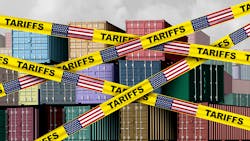The Inconvenient Truth of Trump’s Tariff Plan on US Supply Chains
Key Highlights
- President Trump's tariffs have increased costs and disrupted global supply chains, leading to inflation and economic uncertainty.
- Major companies like Apple and John Deere are shifting sourcing and manufacturing strategies to mitigate tariff impacts, including reshoring and diversification.
- But retaliatory tariffs from countries like China have significantly reduced demand for U.S. exports, especially in agriculture, causing economic strain across multiple sectors.
- Policy shifts towards reshoring and automation aim to reduce dependency on foreign supply chains, but also highlight the need for a balanced, strategic trade approach.
President Donald Trump has woven a complex web of tariff plans. It's time for the U.S. Trade Representative's office to pause, reflect and reassess its strategy.
The implementation of Trump’s tariff plan has introduced a complex and often contradictory landscape to American supply chains.
Despite the volatility and unpredictability of these tariffs, the House of Representatives has continued to cede tariff-setting powers to the executive branch, underscoring a troubling trend in which economic policy is increasingly shaped by unilateral decisions rather than deliberative processes.
Rising Costs and Consumer Strain
American consumers have begun to feel the effects of these tariffs in their daily lives. Prices for everyday goods—from clothing to auto parts and electronics—have risen, contributing to inflationary pressures and consumer concerns. While the increases may appear modest in isolation, their cumulative impact is significant enough to concern both consumers and Federal Reserve policymakers. This economic strain is exacerbated by a fragile labor market, further complicating the broader economic outlook.
Beyond consumer prices, the ripple effects of Trump’s tariff plan have disrupted global supply chains.
Corporate Adaptation and Supply Chain Reconfiguration
With tariffs imposed on imports from over 90 countries, companies are grappling with increased trade costs and heightened uncertainty. Walmart, for instance, has attempted to mitigate the impact by offering customer discounts, though analysts predict these costs will eventually be transferred to consumers.
Other firms are seeking alternative sourcing options in non-tariffed countries, introducing new logistical complexities. For example, Apple has increased its production of iPhones in India to reduce its exposure to trade tensions and tariffs from both the U.S. and China. This strategy allows Apple to mitigate geopolitical risks and potentially lower costs.
Auto manufacturers like Stellantis have already paused production at North American plants due to rising component prices, illustrating the tangible consequences of these trade policies.
Retaliation and Demand Shock
To make things worse, the retaliatory measures from countries affected by Trump’s tariffs have further intensified the disruption.
China, in particular, has responded by curtailing its demand for American products. A notable example is the directive issued to Chinese tech firms, including ByteDance and Alibaba, to cancel orders for Nvidia's RTX Pro 6000D AI chips. The resulting decline in demand for Nvidia chips threatens to destabilize the company’s supply chain and underscores the vulnerability of American tech firms to geopolitical shifts.
The agricultural sector has been particularly hard-hit by China’s retaliatory tariffs.
Historically the largest buyer of U.S. soybeans, China imposed tariffs of up to 34%, leading to a dramatic reduction in purchases. In 2025, China placed zero new orders for the fall harvest, causing soybean prices to plummet below $9 per bushel.
Ripple Effects Across the Agricultural Supply Chain
This decline in sales of soybeans has had cascading effects across the entire soybean supply chain, from farmers to equipment manufacturers like John Deere.
John Deere exemplifies the unintended consequences of Trump’s tariff strategy. The company reported a 26% drop in net income and a 9% decline in sales, attributing much of this to reduced farmer spending and increased production costs due to tariffs on steel and aluminum.
Farmers, facing lower revenues, have delayed capital investments, opting to retain old machinery or purchase used equipment. This shift has led to layoffs at John Deere plants in Illinois and Iowa, forcing the company to renegotiate supply contracts and explore local sourcing options.
Along the soybean supply chain, the trucking industry has also felt the impact of reduced agricultural exports.
With fewer soybean shipments, logistics operations across rail, trucking and port facilities have been disrupted. The logistics industry is bracing for a downturn as tariffs dent import volumes.
This decline affects not only truck drivers and trucking companies but also truck sales and maintenance services, illustrating the far-reaching consequences of trade policy decisions.
Reshoring Pain
In response to Trump’s tariff plan, John Deere has embarked on a strategic realignment focused on onshoring production.
By reshoring manufacturing operations to North America, the company aims to reduce exposure to Chinese tariffs and align with USMCA trade rules. This move is expected to cut inventory costs by $1 billion and reduce lead times by 50%.
Deere has also diversified its supplier base, investing in domestic manufacturing capacity and committing to supplier diversity initiatives.
Automation and digitization are central to Deere’s onshoring strategy. With a $20 billion investment in AI and automation, the company seeks to reduce manual labor dependency and enhance operational efficiency. These technological advancements enable hybrid inventory models and real-time analytics, positioning Deere as a leader in precision agriculture and smart manufacturing.
A Call for Strategic Reflection
While John Deere’s efforts are commendable, they highlight the broader issue: Trump’s tariff plan has created unintended consequences that undermine the very sectors it aimed to protect.
The agricultural and manufacturing industries, cornerstones of the American economy, have suffered due to increased costs, reduced demand and supply chain disruptions.
It is imperative for policymakers to reflect on these outcomes and adjust the U.S. trade strategy to rebuild the manufacturing sector sustainably.
A balanced approach that fosters domestic resilience while maintaining global competitiveness is essential for long-term economic stability.
About the Author

Christopher S. Tang
Distinguished Professor and Ca
Christopher Tang is a distinguished professor and the holder of the Carter Chair in Business Administration at the UCLA Anderson School of Management.
A scholar of global supply chain management, Tang’s interest in his field began in the private sector when he worked for IBM to solve internal production planning problems. Exposure to real-life industry projects motivated his academic research, where he developed teaching cases on microfinancing for the poor, mobile platforms for developing economies and new business models in the age of the Internet, among other topics.
Tang has been a consultant to numerous corporations, including Amazon, HP, IBM, Nestlé and Accenture. He has published six books and in addition to being a regular contributor to IndustryWeek, he has written for the Wall Street Journal, Barron’s, Financial Times, China Daily, Fortune, Bloomberg Law and The Guardian.
